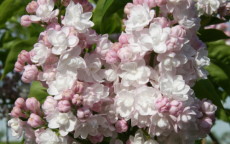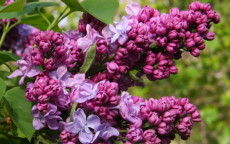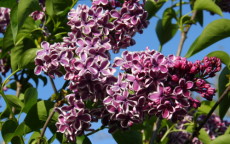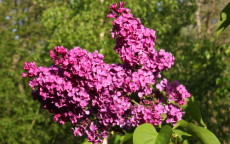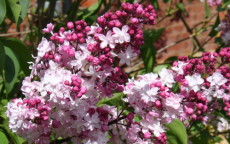Lilac
Lilacs (Syringa) are small trees or large shrubs known for their superb scented flowers.
Beauty of Moscow
Beauty of Moscow, also known as Krasavitsa Moskvy, features fragrant double-white blossom.- Flower colour: Pink - light
- Height after 10 years: 2.5m-3.5m / 8ft-12ft
- Awards: RHS AGM (current)
Syringa vulgarisCharles Joly
A small lilac featuring strongly scented purple / red flowers.- Flower colour: Purple
- Height after 10 years: 2.5m-3.5m / 8ft-12ft
- Awards: RHS AGM (current)
Syringa vulgarisKatherine Havemeyer
A vigorous lilac featuring clusters of purple fragrant double flowers.£74.00buy- Flower colour: Mauve
- Height after 10 years: 2.5m-3.5m / 8ft-12ft
- Awards: RHS AGM (current)
Syringa vulgarisMadame Lemoine
A large spreading lilac, featuring clusters of double white flowers.£74.00buy- Flower colour: White
- Height after 10 years: 2.5m-3.5m / 8ft-12ft
- Awards: RHS AGM (current)
Syringa vulgarisPalibin
A slow-growing dwarfing Korean lilac, ideal for borders and smaller spaces.£71.95buy- Flower colour: Mauve
- Height after 10 years: 1.5m-2.5m / 5ft-8ft
- Awards: RHS AGM (current)
Syringa meyeriPink Perfume
Pink Perfume features clusters of pink / red flowers in May, with secondary flowering later in the summer.- Flower colour: Pink
- Height after 10 years: 1.5m-2.5m / 5ft-8ft
Syringa vulgarisPrimrose
As the name suggests this lilac features clusters of pale primrose yellow flowers.£65.50buy- Flower colour: Yellow
- Height after 10 years: 2.5m-3.5m / 8ft-12ft
- Awards: RHS AGM (current)
Syringa vulgarisPrince Wolkonsky
Prince Wolkonsky lilac features large scented clusters of red / purple flowers.- Flower colour: Purple
- Height after 10 years: 2.5m-3.5m / 8ft-12ft
Syringa vulgarisSensation
Sensation is an unusual lilac with large single purple / white flowers.£74.00buy- Flower colour: Mauve
- Height after 10 years: 2.5m-3.5m / 8ft-12ft
- Awards: RHS AGM (current)
Syringa vulgarisSouvenir de Louis Spaeth
Souvenir de Louis Spaeth is a highly scented lilac, with lilac-purple flowers.£74.00buy- Flower colour: Purple
- Height after 10 years: 2.5m-3.5m / 8ft-12ft
Syringa vulgarisSweetheart
Sweetheart features large clusters of traditional lilac-coloured flowers.- Flower colour: Mauve
- Height after 10 years: 2.5m-3.5m / 8ft-12ft
Syringa vulgaris
How to choose Lilac
Lilacs (Syringa) are small trees or large shrubs, part of the olive family. They are best known for their stunning spring blossom. While many varieties - as the common name suggests - have lilac-coloured blossom, there are also varieties with mauve, purple, white or yellow blossom.
Flowering usually occurs in May and lasts several weeks, into early June.
The flowers of most lilacs are also strongly scented. Some are also "double" flowers, featuring a larger number of petals per flower, which give a more dense and colourful impact.
All lilacs like to be in full sun if possible, although they will tolerate some shade.
Lilacs will grow in most good soils, but are a particularly good choice if you are on chalk or slightly alkaline soil.
Most lilacs will reach a height of about 3m after 10 years or so, with a typical spread of about 2m. They tend to be quite upright and do not spread sideways much.
Lilacs quickly become multi-stemmed shrubs as a result of suckering from the base of the original stem. We graft our lilacs on to rootstocks of the lilac species Syringa tomentella which is less prone to suckering, but if you prefer to maintain a single stem you should periodically check for and remove suckers as they arise.
Young lilacs don't need pruning at all, so leave them for the first couple of years after planting. Older lilacs benefit from a light prune immediately after the flowers have finished, typically in early June. This will encourage more blooms the following year. If you wish to hard-prune a lilac, perhaps to reduce height, then choose a mild spell in mid-winter.
All lilacs are cold-hardy and are unlikely to need winter protection in UK conditions.

